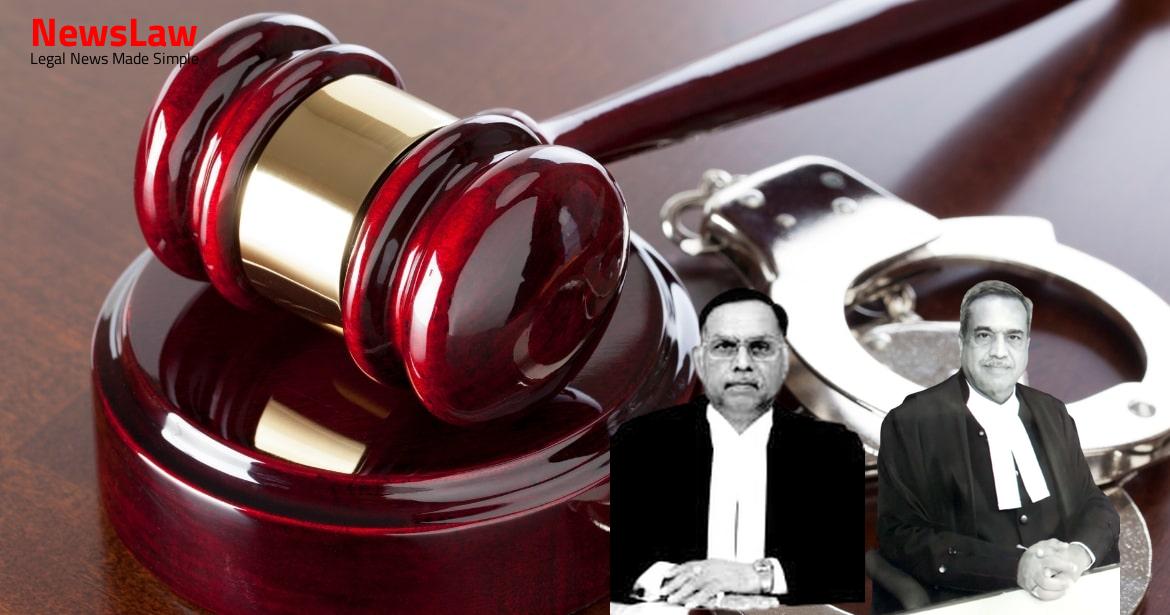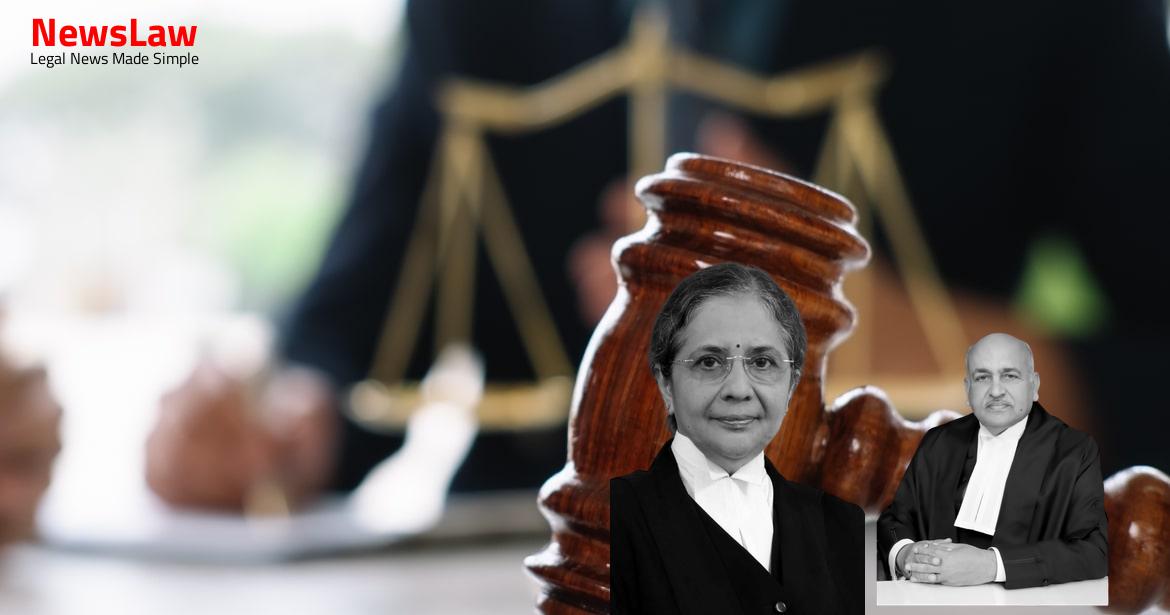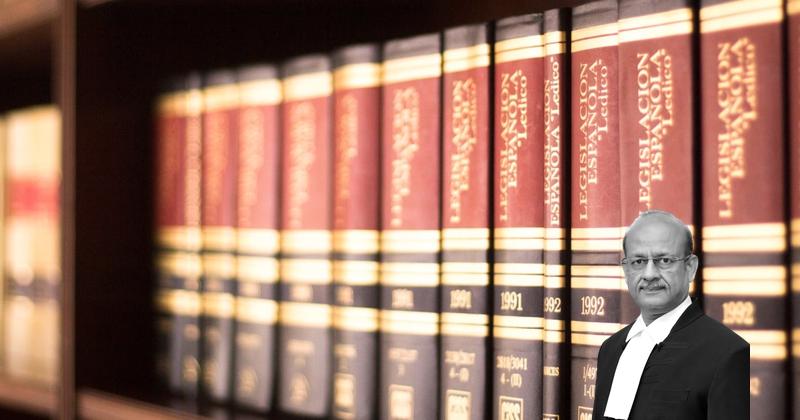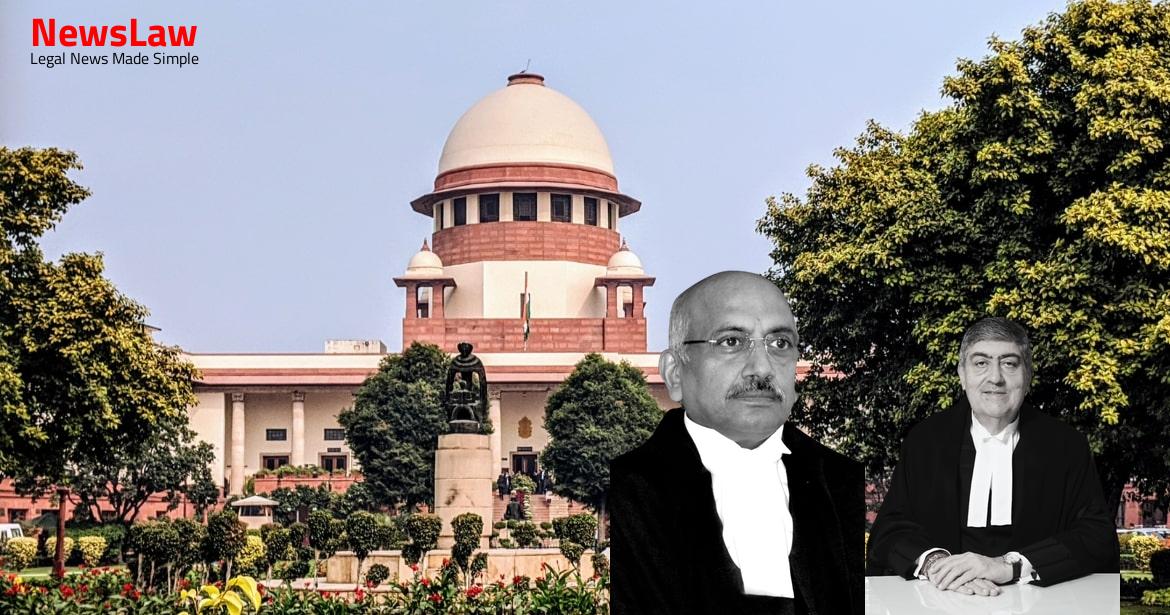In a recent legal case, the court’s in-depth analysis of witness testimony brings to light the crucial role it plays in determining the outcome of criminal proceedings. The focus is on the reliability, consistency, and credibility of witness depositions, as highlighted by the court’s thorough examination. Join us as we explore the intricate legal aspects surrounding witness testimony in this case.
Facts
- Mother of the deceased Mullo Bai was the sole eyewitness to the incident.
- The axe used in the offence was recovered at the instance of original accused no.1.
- Ratan Singh – PW1 and Pahalwan Singh – PW2 did not support the prosecution and were declared as hostile witnesses.
- Two witnesses were examined by the defense to establish an alibi for original accused no.1.
- The High Court dismissed the appeal by accused nos. 2 to 5.
- All accused pleaded not guilty and were tried for the offences.
- The investigating officer obtained relevant evidence including medical and postmortem reports.
- A total of 12 witnesses were examined by the prosecution including the informant Mullo Bai.
- The accused shared a common object which led to the murder of Bal Kishan.
- Accused Bal Kishan attacked the victim in the cattle shed, leading to the murder.
- The case was committed to the Court of Sessions.
- The appellants, original accused Nos. 2 to 5, were convicted under Section 302 read with Section 149 of the IPC based on the evidence of the sole eye-witness, Mullo Bai – PW8.
- The appellants were dissatisfied with the trial court’s judgment and filed an appeal (Criminal Appeal No. 574 of 2006) before the High Court of Madhya Pradesh at Gwalior.
- Accused No. 1, Bal Kishan, also filed an appeal which was dismissed by the High Court.
- The High Court upheld the conviction of the appellants and confirmed the charges against them.
Also Read: Interpretation of Lease Agreement and Compulsory Registration
Arguments
- The appellants argue that the High Court erred in convicting them based on the statement of PW8 recorded under Section 161 Cr.P.C., which is not admissible in evidence.
- They claim there is no concrete evidence of common object or conspiracy among the accused to kill the deceased.
- The appellants were convicted under Section 149 IPC without proof of common intention/object, which they contest.
- The dispute between parties indicates possible false implication of the appellants.
- Both Trial Court and High Court findings were based on evidence, and the appeal questions interference in their decision.
- The dismissal of the SLP for one of the accused does not impact the present appeal.
- The appellants challenge the conviction solely based on the deposition of PW8, citing contradictions and improvements in her testimony.
- They argue that identification of the accused on a dark night is unreliable, especially since no torch was recovered at the scene.
- The State contends that conviction based on a single eyewitness is valid, emphasizing the crucial testimony of PW8.
- The State points out new details provided by PW8 in court, corroborating the case against the appellants.
- The defense highlights inconsistencies and omissions in PW8’s statements regarding the incident location and appellant actions.
- The defense distinguishes the case of the appellants from that of another accused, stressing fewer contradictions in the latter’s case.
- Despite the dismissal of the SLP for one accused, the defense urges a fresh review of the present appeal on its own merits.
- The defense requests the appeal to be allowed, opposing the State’s opposition.
- PW8 – Mullo Bai is the sole eyewitness to the incident.
- Both courts justified in convicting the accused based on PW8’s deposition.
- Presence of accused nos. 2 to 5 established by PW8 at the time of the incident.
- Identification of accused by PW8 from their voices mentioned in her deposition.
- Accused no.1 was convicted based on PW8’s testimony.
- No reason to doubt PW8’s credibility regarding accused nos. 2 to 5.
- Conviction of the appellants under Section 302 r/w Section 149 IPC upheld by both courts.
- Appeal to dismiss based on the above submissions.
- Presence of PW8 at the spot is natural as the incident occurred in her house.
- PW8 is considered a reliable and trustworthy witness.
Also Read: Enhancing Compensation and Modifying Sentences: A Legal Analysis
Analysis
- Statement under Section 161 Cr.P.C. can only be used to prove contradictions and/or omissions.
- Sole witness PW8’s deposition is relied upon to convict the original accused no.1 but not the other accused.
- Material contradictions, omissions, and improvements found in PW8’s evidence regarding accused nos. 2 to 5.
- Contradiction between PW8’s statement and deposition regarding the presence of lathis with accused nos. 2 to 5.
- PW8’s statement under Section 161 Cr.P.C. regarding the accused having lathis cannot be relied upon.
- Improvement in PW8’s deposition relating to the presence of a chimney light at the crime scene.
- Depositions must be trustworthy, reliable, and free from contradictions, omissions, and improvements to convict the accused.
- Settled law states that a statement under Section 161 Cr.P.C. is inadmissible in evidence.
- Original accused nos. 2 to 5 have a different case compared to original accused no. 1.
- In her statement, the witness did not mention that accused Santosh and Rakesh caught Bal Kishan.
- There are material contradictions, omissions, and improvements in the witness’s statement regarding accused nos. 2 to 5.
- It is not safe to convict the appellants based on the evidence of the sole witness (PW8).
- The appellants are entitled to the benefit of doubt due to the contradictions, omissions, and improvements.
- The benefit of material contradictions should favor the appellants.
- Material contradictions exist in PW8’s statement under Section 161 Cr.P.C. and deposition in court regarding accused nos. 2 to 5.
- The prior enmity and lack of support from independent witnesses further support giving the appellants the benefit of doubt.
Also Read: Exemption from Property Tax for Central Government-owned Buildings
Decision
- The impugned judgment and order of conviction passed by the learned Trial Court and confirmed by the High Court convicting the appellants – accused nos. 2 to 5 for the offence under Section 302 r/w Section 149 of the IPC are quashed and set aside.
- The appellants – original accused nos. 2 to 5 are acquitted of the charges for which they were tried.
- The appellants – accused nos. 2 to 5 are to be released forthwith if not required in any other case.
- The present appeal is allowed.
Case Title: PARVAT SINGH Vs. THE STATE OF MADHYA PRADESH (2020 INSC 244)
Case Number: Crl.A. No.-000374-000374 / 2020



